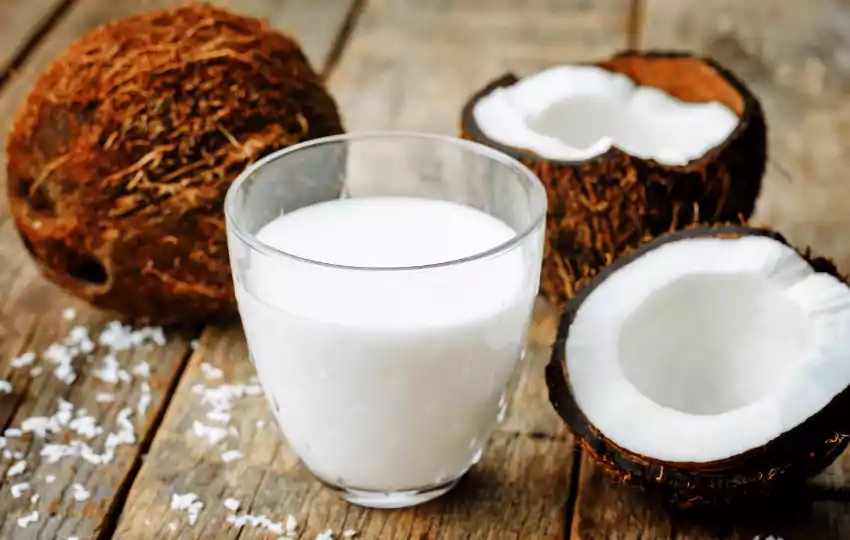Coconut milk is sweet, versatile, creamy milk obtains from coconut flesh. It is commonly used in many Asian cuisines from India and Thailand to other Eastern Asia Countries in curry, meat, vegetables so on.
So, Is there a substitute for coconut milk in curry if you’re running out of stock from your nearest shop? If so, then what is a good coconut milk substitute curry without losing its taste.
Fortunately, there are lots of options you may choose for coconut milk alternatives not only for curry but used for any purpose where coconut milk is essential.
I love cooking and experimenting with all dishes with the nearest ingredients that seem similar; from there, I found 14 best and most suitable coconut milk replacements from the curry to any recipe.
You may check the best Yogurt substitutes for marinades, In Naan and Biriyani– all are vegan and lactose-free options.
So…
What is coconut milk?
Coconut milk is a decadent and creamy liquid made from the flesh of mature coconuts. It is often used as an alternative to dairy milk in recipes, and it has many of health benefits due to its high nutrient content. Some people also use coconut milk for skincare or as a base for homemade beauty treatments.
There’re two main kinds of coconut milk: canned and fresh. You can use both of them alternatively.
· Canned coconut milk is the most commonly available type, and it is typically made from a blend of water and coconut cream. It has a higher texture and flavor than fresh coconut milk, but it also contains more saturated fat.
· Fresh coconut milk is made by grating the flesh of mature coconuts and blending it with water. It’s lighter in texture and flavor than canned coconut milk, but it’s also lower in calories.
Coconut milk uses
Coconut milk is a famous ingredient in many cuisines around the world. It is used to make curries, stews, soups, and sauces because of its creamy texture and naturally sweet flavor.
There are also several other culinary uses for coconut milk.
· Like to use it as a thickening agent in soups and stews, or
· Prefer to use it as a substitute for regular cream when baking or making desserts.
· It can also be utilized in place of eggs when making omelets or quiches.
· Additionally, it makes an excellent base for smoothies and can be used in place of cow’s milk when making pancakes or waffles.
Coconut milk is a healthy and delicious alternative to many other ingredients, so don’t be afraid to experiment with it in your cooking!
Do you need coconut milk for curry?
So, first thing first… Do you need coconut milk for curry? Is this a real essential!
Well… In my opinion, No.
You don’t need necessarily coconut milk for a curry. Curry can be produced with or without coconut milk, in fact, with various types of milk, including dairy milk; for a vegan-friendly option, try using soy milk or another type of nut milk.
However, No one Can’t deny, How much coconut milk brings the richy favor to a curry. All thanks to its smell and perfect balance of natural sweetness and consistency.
So, Coconut milk will add a unique flavor to your curry, but it’s unnecessary.
But after exploring all types of milk, I always prefer coconut milk for my curry. I think it’s a good idea to include coconut milk in curry.
Not only does it add a nice creamy texture, but it also gives the curry a healthy and great flavor as well.
What can I use instead of coconut milk?
There are many ways to make a dairy-free and vegan-friendly version of coconut milk.
One popular method is to use a can of full-fat coconut milk, empty it into a bowl and whisk in some almond or soy milk until the desired consistency is reached.
Another way is to blend together equal parts of soaked cashews, water, and coconut oil until smooth.
You can also try using plain soy milk instead of coconut milk, although this may result in a slightly different flavor and consistency.
Also, try coconut cream, coconut milk powder, almond milk, soy milk, cashew milk, nut milk, powder milk, regular milk, Thai curry with yogurt, oat milk, sour cream, half-half, coconut flakes, and homemade coconut milk instead of coconut milk in curry or any recipes.
See in detail how to substitute all of this milk for coconut milk.
All Vegan Coconut Milk Substitute Curry
1. Coconut Milk substitute COCONUT CREAM
Coconut cream is obtained from the white flesh of mature coconuts. The flesh is grated or blended and then squeezed to produce a thick, creamy liquid.
Coconut cream has a rich, creamy texture and a subtle coconut flavor, exactly like coconut milk. It’s frequently utilized as an alternate for dairy in desserts and baked goods, such as bread, cakes, pies, ice cream, and custards. Additionally, it can be used to add richness to curries, soups, and other savory dishes.
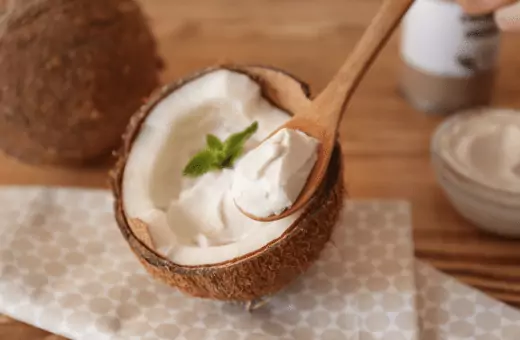
Coconut cream is an ingredient in many traditional Asian dishes, such as curries and desserts. So, coconut cream is easily substituted for coconut milk.
Coconut cream can be bought in cans or cartons at most grocery stores. It should be stored in the refrigerator and used within a few days of opening. Any unused portion can be frozen for up to 3 months.
2. COCONUT MILK POWDER- Substitute for coconut milk in Thai curry
Coconut milk powder is obtained from matured coconut and is a good source of fat, protein, minerals, and vitamins like vitamins B1, B3, C, and E. It can be used as a substitute for coconut milk, as well as in many commercial products to make them rich in coconut properties.
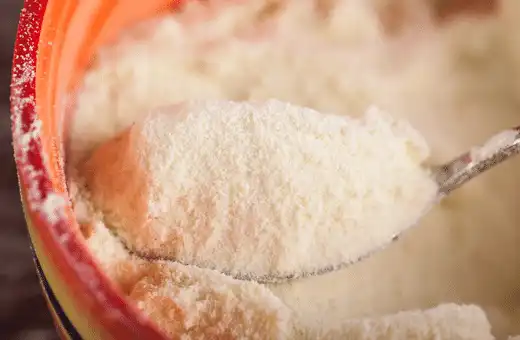
The powder is mainly used in various bakery products such as cakes, biscuits, and other desserts to give that rich flavor and aroma. It can also be used in making various dairy products such as ice creams, yogurts, and milkshakes to give a rich texture and taste. Coconut milk powder is generally mixed with other ingredients like sugar or corn syrup, depending on the end product in which it is being used.
Coconut milk powder has excellent thickening properties and can be used as a stabilizer in frozen foods. It is also used in many homemade cosmetic products such as soaps and lotions to give that moisturizing effect.
3. ALMOND MILK-Healthy substitute for coconut milk in curry
Almond milk is a dairy-free milk alternative made from almonds. It’s rich in vitamins and minerals, and it has a creamy, nutty flavor that goes well in coffee, smoothies, and baking recipes.
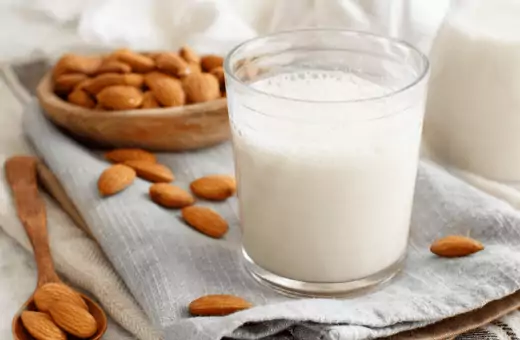
Some people like to use it as a replacement for dairy milk because it’s lower in calories and fat than regular dairy milk, and it can also be easier to digest.
When making curry, you can substitute almond milk for coconut milk. This will give the curry a lighter flavor and make it more suitable for those who are lactose impatient or have a nut allergy. If you do use almond milk, be sure to use a dairy-free variety so that your curry is completely vegan.
4. Substitute SOY MILK for coconut milk in curry
If you are looking for a delicious, healthy meal that is quick and easy to prepare, then try this vegetarian curry recipe. The creamy coconut milk in the sauce adds a rich flavor to the vegetables while still keeping this dish light and healthy. If you desire not to use coconut milk, however, feel free to substitute it with soy milk.
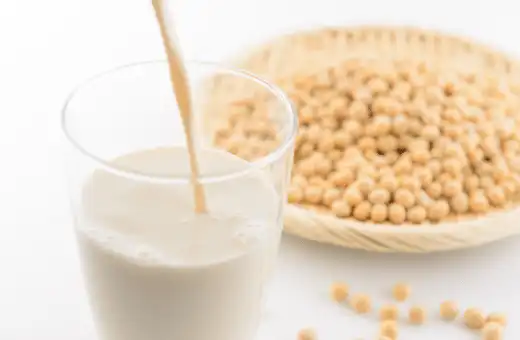
To make the curry, start by heating a little oil in a large skillet over medium heat. Next, add the garlic and onion, along with a pinch of salt, and cook for about 2-3 minutes until softened. After that, add the potatoes and carrots to the pan and stir to coat them in the oil, and then cook for another 3-4 minutes, until the vegetables start to brown slightly.
Therefore, add the curry powder and stir to combine well with the other ingredients in the pan. Next, cook for another 30 seconds or so until fragrant. Finally, pour in the soy milk and bring it all to a simmer. Lower the flame to low and continue cooking for about 15 minutes until the vegetables are tender and the sauce has thickened.
Serve this curry with steamed rice or quinoa and garnish with fresh cilantro leaves and lime juice. Enjoy!
Additionally, Soy milk is very good for the health. Soy milk is completely plant-based milk. Avoid using soy milk for those who have soy allergies and choose any other suitable replacement.
5. CASHEW MILK- Suitable Replacement for Coconut Milk
Another vegan choice for coconut milk curry is cashew milk. Cashew milk is obtained from the blending and crushing of the cashew fruit, known as the nut. The cashew nut is a kidney-shaped nut with a hard shell and has a high oil content.
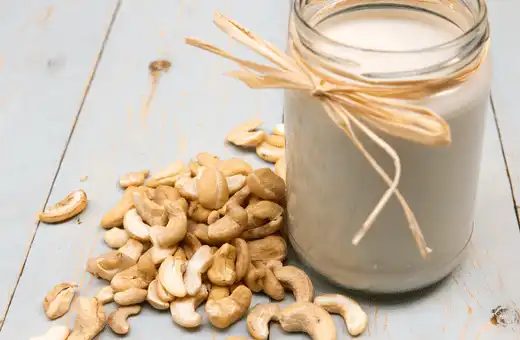
Cashew milk is generally low in fat, cholesterol-free, and low in calories as well. Cashews are one of the most versatile nuts that can be easily consumed raw or roasted. They also offer great health benefits.
Additionally, you can add cashew milk to your other recipes, such as rice, soups, or lamb.
6. Substituting NUT MILK for Coconut Milk in Thai Curry take You to the next level.
If you want to make a curry without using coconut milk, you can substitute nut milk instead. Nut milk will give the curry a creamier texture and will not alter the taste too much.
Just be sure to use mild-flavored nut milk, so it doesn’t overpower the other flavors in the curry. To make a curry with nut milk, you will need:
Ingredients:
- 1 tbsp olive oil or vegetable oil
- 1 onion, chopped
- 2 cloves garlic, minced
- 1 lb chicken or tofu (optional) – cut into bite-sized pieces or cubed tofu if using
- 2-3 tsp curry powder (depending on how spicy you like it)
- 1 can (14 oz) diced tomatoes, undrained
- 1 cup nut milk
- Salt and pepper to taste
Instructions:
1. Warm the oil in a big skillet or wok over medium-high heat.
2. Add the onion and garlic and cook until softened, stirring occasionally.
3. If using chicken or tofu, add it now and cook until browned.
4. Stir in the curry powder and cook for 1 minute until fragrant.
5. Add the diced tomatoes and nut milk. Next, bring it to a simmer and cook for 5-10 minutes until heated through.
6. Season with salt and pepper to taste. Serve over cooked rice or noodles. Enjoy!
Read More- Best Substitutes for Nut Milk bag
7. OAT MILK- Suitable Alternative to Coconut Milk
Oat milk has a little sweet flavor and is generally used in coffee, baking, and cooking.– This type of milk is made by soaking oats in water and then blending them into a smooth, creamy liquid.
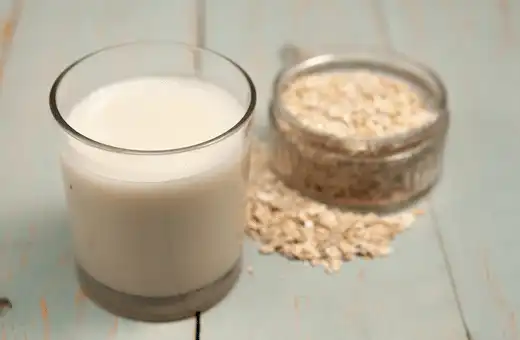
One of the great things about oat milk is that it’s high in fiber and low in calories. Further, oat milk is a suitable source of vitamins and minerals, including calcium, iron, and potassium. Oat milk is also a popular option for those who are lactose intolerant or have a dairy allergy, making it a great choice for those who want to replace cow’s milk in their diet.
You can add this oat milk to make Thai curry. When you add this, it will thicken the gravy and make it more delicious. You can also use this milk while baking cakes or cookies. It will make the texture of the cake very light and fluffy.
You can use either store-bought oat milk or make it at home.
To make oat milk, simply combine the desired amount of oats with water in a blender and blend until the mixture is smooth. If you’re using rolled oats, you may need to add a little more water to get the desired consistency.
Once you’ve achieved your desired texture and flavor, strain the mixture through a fine-mesh sieve or cheesecloth to remove any solids. Transfer into a sterile glass jar and store it in the fridge for up to one to two weeks, use whenever you want.
8. COCONUT FLAKES- Fair Coconut Milk Alternative to Thai Curry
One of my favorite alternatives to coconut milk is coconut flakes. Coconut Flakes are obtained from the inner white flesh of mature coconuts. The flakes are produced by drying and flaking the coconut meat. Coconut flakes are used as an ingredient in various food items such as granola, cookies, cakes, etc.
Coconut flakes are available in both sweetened and unsweetened varieties. Sweetened coconut flakes are often used as toppings on desserts. In contrast, unsweetened flakes can be used in savory dishes, including curry, dal, and meat dishes.
Therefore, You can use coconut flakes instead of coconut milk to make your curry. Just be sure to add a little bit of sugar to balance out the flavors.
Preserve it in an airtight container at room temperature for up to six months.
To make curry from coconut flakes, follow this easy recipe.
To start, you’ll need to grind up the coconut flakes into a fine powder. This can be done using either a food processor or a blender. If you’re utilizing a food processor, just add the flakes to the bowl of your machine and pulse until they’re finely ground. If you’re using a blender, add the flakes and some water and blend until smooth.
Once the flakes are ground, add them to your curry recipe along with enough water to thin it out. The amount of water you’ll need will depend on how thick or thin you want your curry to be. Begin with a little bit at a time and add more as needed until you reach the desired consistency.
Finally, simmer your curry over low heat for about 10-15 minutes until it has thickened and is warmed through. Serve instantly with your favorite toppings, like chopped cilantro or freshly toasted coconut flakes.
This substitution will change the flavor and texture of your curry slightly, but it will still be delicious and should work in most recipes.
Other Non- Vegan options for Coconut Milk
9. POWDER MILK- A quick substitution for Coconut milk
You can also opt to use full-fat powdered milk, which will provide a similar texture to coconut milk. If you plan on using full-fat powdered milk in your curries, it is important that you dissolve the powder fully before adding it to your dish.
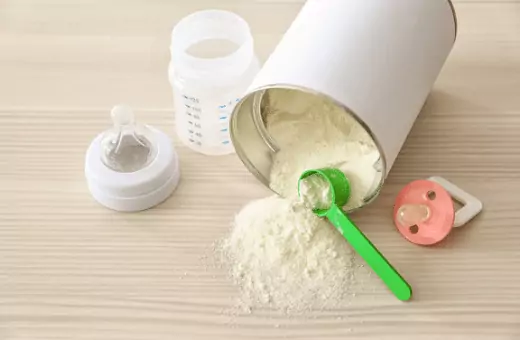
Simply mix the powder milk with an equal amount of water to make makeshift coconut milk. Add this mixture to your curry and cook as usual. Your curry will turn out just as creamy and flavorful with the powder milk substitute.
This will help ensure that the curry comes out well-flavored and creamy. Overall, it is possible to substitute powder milk for coconut milk in curry recipes as long as you are able to find a suitable alternative that will provide the same texture and flavor.
10. Substituting REGULAR MILK For Coconut Milk in Curry
Milk is an excellent coconut milk substitute if you want to make a delicious curry in less time. Additionally, it is very easy to find milk in most parts of the world, which makes it an excellent option for those who are on a tight budget or have limited access to local ingredients.
It is also very versatile and can be used in many different types of cooking. The fat content found in milk helps it add flavor and texture to your curry.
11. Try THAI CURRY with YOGURT instead of coconut milk
Another is my most preferable subs for coconut milk in Thai cuisine. When someone asks me about an alternative to coconut milk, I suggest this one( Not for lactose intolerance). But instead of yogurt, you use any cashew cream.
Trust me, try just once. Swap the coconut milk, and make a mixture of Thai curry paste with yogurt, your curry going to be amazingly flavorful, and tastebuds will dance.
Add Yogurt instead of coconut milk to Thai curry is a great idea. The sweetness of the yogurt helps to offset the spiciness of the curry, and it also adds a lovely creaminess to the dish.
Initiate by heating some oil in a large skillet or saucepan over medium heat. Add your desired vegetables to the pan, along with any herbs or seasonings that you might like.
Cook the veggies until they are softened, occasionally stirring so that they don’t burn.
Once the veggies are tender, add the mixture and continue to cook until it is all heated through. Serve this curry over rice or noodles for a meal that will be enjoyed by all.
12. SOUR CREAM – a great substitute for coconut milk
Sour cream is a great substitute for coconut milk when making curry, as it adds a delicious creaminess to the dish.
Simply stir some sour cream into the curry sauce until it is well combined and has reached your desired consistency. Just keep in mind that these substitutions will change the flavor of the dish slightly. So, if you are looking for a more traditional curry flavor, it is best to stick with coconut milk.
13. Add HALF-HALF to the place of coconut Milk
If you want to make your curry without coconut milk, you can substitute half-half for coconut milk to make it lighter. The easiest way to substitute half-half for coconut milk when making curry is to use a mixture of cream and water. Start by substituting 1/4 cup of the cream with about 3/4 cup of water, then add more if needed.
You can also add more vegetables like pumpkin, sweet potato, zucchini, eggplant, or green beans to make it more nutritious. Serve with rice, quinoa, or cauliflower rice.
Last…
Homemade coconut milk Substitute
Making coconut milk at home is a very simple process that can be done in just a few minutes.
The first step is to remove the flesh of a mature coconut and grind it into a fine paste.
Then, simply pour some water over the coconut paste and blend or whisk until you reach your desired consistency.
Finally, strain out the solids and enjoy your delicious, homemade coconut milk!
If you want to make richer and creamier coconut milk, you can also add some coconut cream or full-fat coconut milk to the recipe. This will give your finished product a lovely creamy texture and flavor that is sure to please.
FAQs Related To coconut Milk & Its Alternatives
Q1. Can I use milk instead of coconut milk for curry?
Yes, you can! Coconut milk imparts a rich and creamy flavor to curry, but if you’re out of it or don’t have it on hand, milk is a perfectly acceptable substitution.
Just remember that your dish will be less rich and flavorful with milk than with coconut milk. If you are looking for a vegan substitute, almond or soy milk are good options.
Q2. Can I use desiccated coconut instead of coconut milk?
Yes, you can use desiccated coconut instead of coconut milk. Still, it will give the dish a different taste and texture.
Q3. Can you skip coconut milk in curry?
Yes, you can definitely skip the coconut milk in curry! There are plenty of other ways to make a delicious and flavorful curry without it.
Try using vegetable broth or water instead. You could also add some extra spices or herbs to compensate for the lack of coconut milk. Whatever you do, don’t give up on making curry just because you don’t have any coconut milk!
There’re many other delicious ingredients that can be added to a curry, and you’ll find one that’s perfect for your palate. So go ahead and get creative – the possibilities are endless!
Q4. Can I substitute coconut cream for coconut milk in curry?
Coconut cream and coconut milk are similar ingredients, but they have slightly different uses. Coconut cream is thicker and richer in flavor than coconut milk, making it ideal for sauces or rich curries.
Q5. Can I use water instead of coconut milk in curry?
Yes, water can be used instead of coconut milk in curry. Coconut milk will add a richer flavor to the dish, but water will still work well.
If you’re searching for cutting down on fat and calories, using water instead of coconut milk is a good option. You can also try using light coconut milk, which has less fat and calories than the full-fat version.

